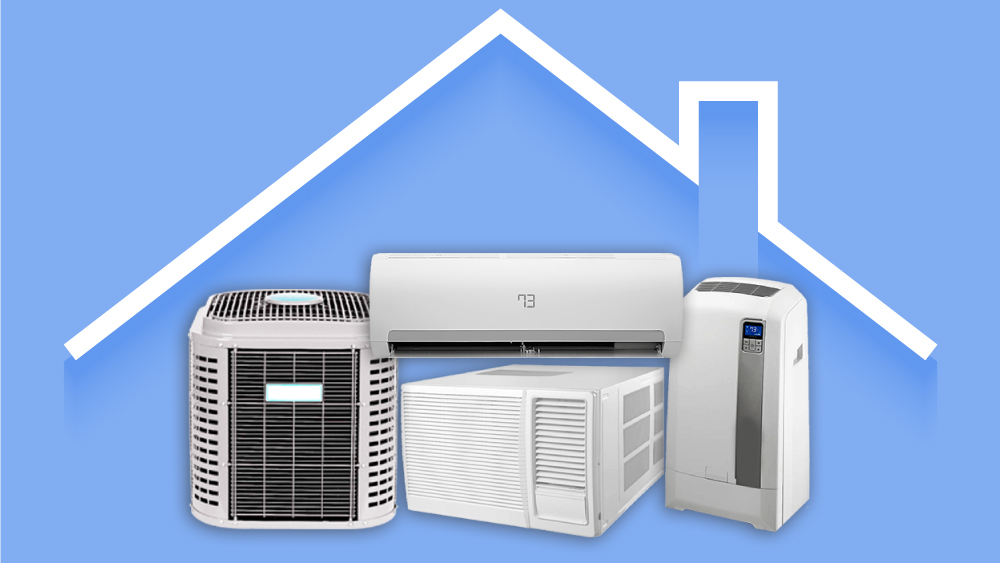Choosing the right air conditioning system for your home can greatly impact your comfort, energy efficiency, and long-term costs. With various types of air conditioners available, it’s essential to understand their differences, benefits, and ideal use cases. This guide will explore the most common types of air conditioning systems and offer tips on how to select the best option for your home based on its size, layout, and climate.
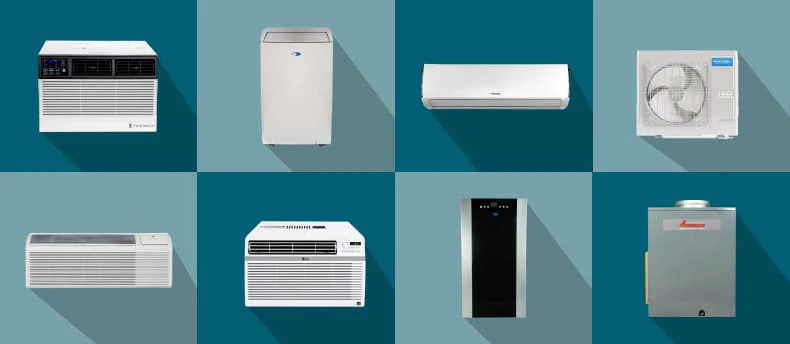
1. Central Air Conditioning
Overview: Central air conditioning systems are among the most popular choices for cooling entire homes. They consist of an outdoor unit that houses the compressor and condenser and an indoor unit connected to the home’s ductwork, distributing cooled air throughout the house.
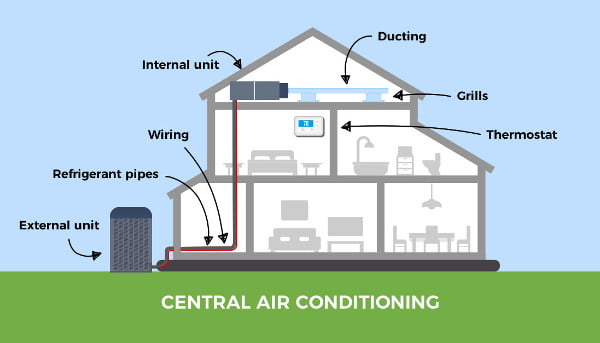
Best For:
- Large homes: Central AC is ideal for cooling multiple rooms or entire houses efficiently.
- Homes with existing ductwork: This system is easier to install when ducts are already present.
Pros:
- Even cooling: Provides consistent temperature control across all rooms.
- Quiet operation: Indoor noise levels are minimal since the main unit is located outside.
- Energy efficiency: Modern central AC systems come with high SEER (Seasonal Energy Efficiency Ratio) ratings that can reduce energy costs.
Cons:
- Initial installation cost: Installing central AC can be expensive, particularly in homes that require new ductwork.
- Maintenance: Regular maintenance is essential to keep the system running efficiently.
2. Ductless Mini-Split Systems
Overview: Ductless mini-split systems consist of an outdoor compressor unit and one or more indoor units that can be mounted on the wall or ceiling. Each indoor unit operates independently, allowing for customized temperature control in different areas.
Best For:
- Homes without ductwork: Ideal for older homes or additions where installing ducts is not feasible.
- Zoned cooling: Perfect for homeowners who want to cool specific rooms or areas.
Pros:
- Energy efficiency: Offers significant energy savings by cooling only the areas in use.
- Flexible installation: Can be installed in various locations and does not require ductwork.
- Customizable comfort: Individual room temperature control enhances comfort and efficiency.
Cons:
- Higher upfront cost per unit: More expensive than window or portable units, especially when installing multiple indoor units.
- Visible indoor units: Some homeowners may not prefer the aesthetic of wall-mounted units.
3. Window Air Conditioners
Overview: Window air conditioners are compact, single-unit systems that fit into a window frame and cool one room at a time. They are popular for cooling individual rooms or small apartments.
Best For:
- Small spaces: Ideal for single rooms, studios, or small apartments.
- Temporary cooling: Great for renters or those who need a seasonal cooling solution.
Pros:
- Affordable: Lower initial cost compared to central and mini-split systems.
- Easy installation: Simple to set up and remove, making it portable and convenient.
Cons:
- Limited cooling range: Best for single-room cooling; ineffective for larger spaces.
- Noise: Window units can be noisier than central or ductless systems.
- Blocking window space: May obstruct natural light and the view from the window.
4. Portable Air Conditioners
Overview: Portable air conditioners are standalone units that can be moved from room to room. They require a nearby electrical outlet and an exhaust hose that vents hot air through a window or sliding door.
Best For:
- Temporary or supplemental cooling: Ideal for renters or as an additional cooling option.
- Spaces without accessible windows: Good for areas where installing a window unit isn’t feasible.
Pros:
- Mobility: Can be easily moved to different rooms.
- Easy installation: Requires minimal setup and can be used right away.
- Versatility: Some units come with heating capabilities for year-round use.
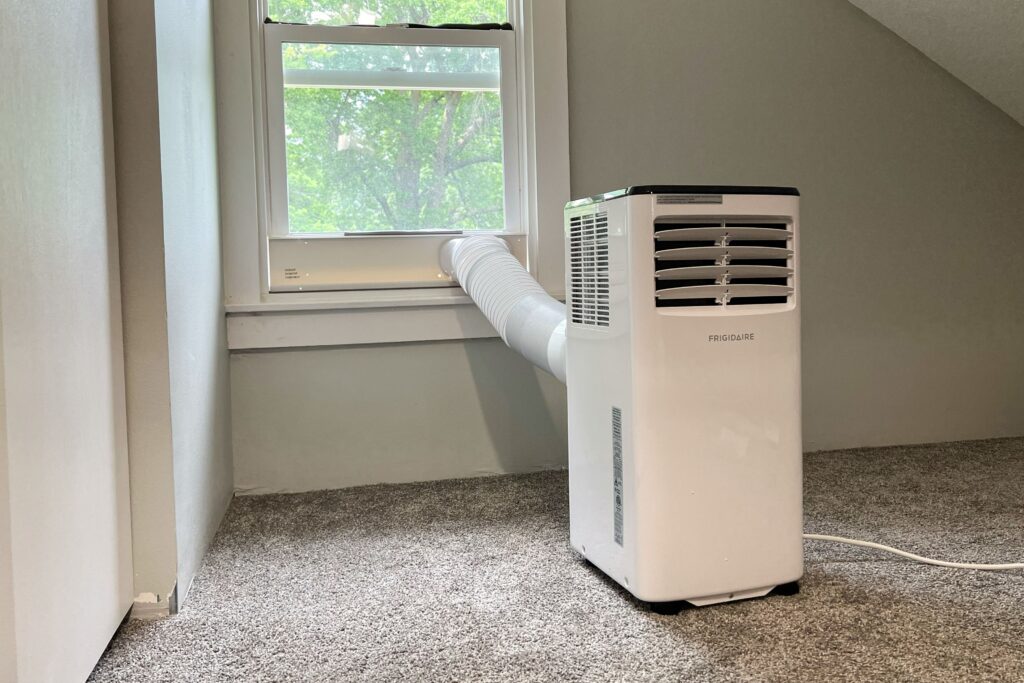
Cons:
- Lower efficiency: Generally less efficient than window or mini-split systems.
- Noise levels: Can be quite noisy due to the motor and compressor being inside the room.
- Limited cooling capacity: Best suited for smaller spaces.
5. Hybrid/Dual Fuel Air Conditioners
Overview: Hybrid systems combine an electric air source heat pump with a gas furnace. These systems switch between electricity and gas depending on which is more energy-efficient at any given time, providing both heating and cooling.
Best For:
- Homes in regions with varied climates: Ideal for areas where summers are hot and winters are cold.
Pros:
- Energy-efficient: Automatically switches to the most cost-effective energy source.
- Year-round climate control: Provides both heating and cooling.
Cons:
- Higher initial cost: Installation can be more expensive than standard HVAC systems.
- Complexity: Requires a professional to install and maintain.
6. Geothermal Air Conditioning
Overview: Geothermal air conditioning systems use underground pipes to transfer heat between your home and the earth. This method takes advantage of the earth’s consistent underground temperature to provide efficient heating and cooling.
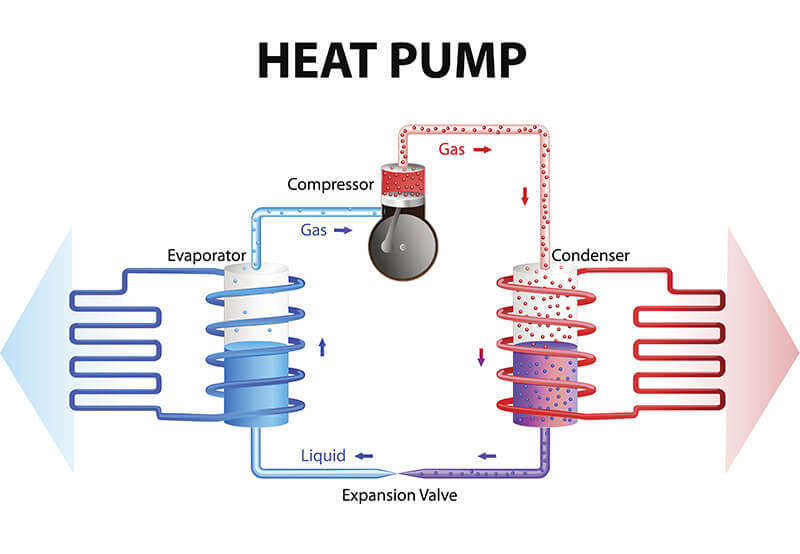
Best For:
- Eco-conscious homeowners: Ideal for those looking to invest in sustainable, long-term solutions.
- Homes with sufficient yard space: Requires underground installation.
Pros:
- Highly energy-efficient: Can reduce energy bills substantially over time.
- Environmentally friendly: Low carbon footprint and minimal greenhouse gas emissions.
- Durable: Long lifespan compared to traditional HVAC systems.
Cons:
- High installation cost: Initial setup is costly due to excavation and system complexity.
- Space requirements: Needs a significant amount of land for installation.
Choosing the Right Air Conditioner for Your Home
To decide which air conditioning system is best for your home, consider these factors:
- Home Size and Layout:
- Small homes or apartments: Window units or portable air conditioners may suffice.
- Medium to large homes: Central air conditioning or ductless mini-split systems are typically better for consistent cooling.
- Multi-level homes: A combination of central AC and ductless mini-splits can be effective.
- Budget:
- Lower budget: Window and portable units are the most affordable options.
- Long-term investment: Central AC, ductless mini-splits, or geothermal systems are more costly initially but provide better efficiency and savings over time.
- Climate:
- Hot, dry climates: Central or ductless mini-split systems with dehumidifying features are ideal.
- Moderate climates: Hybrid systems can provide cost-effective, year-round comfort.
- Energy Efficiency:
- Look for units with a high SEER rating and Energy Star certification to ensure energy efficiency and lower operational costs.
Final Thoughts
Choosing the right air conditioning system is crucial for your comfort, energy use, and budget. By understanding the different types of air conditioners and considering factors such as home size, budget, and climate, homeowners can select the best system for their needs. Consulting with a certified HVAC professional can provide further insights and help you make an informed decision tailored to your specific requirements.
